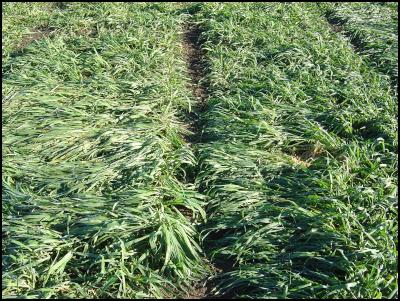Scientists delighted by forage cereals after snow
Crop scientists delighted by forage cereals after snow

Click to enlarge
In surprisingly good condition - oat cultivars at Methven after three weeks of snow.
Crop scientists delighted by forage cereals after snow
Despite 3 weeks under snow, a trial
of cereal cultivars has done remarkably well according to
scientists at Crop & Food Research.
The Methven trial of triticale and oats, including current Agricom cultivars – Hokonui and Milton oats and DoubleTake triticale – survived 3 weeks snow coverage and will provide valuable green feed, which farmers can use now.
“We weren’t sure what we were going to see once the snow melted, but I know some of my colleagues expected a pile of compost,” says Crop & Food cereal agronomist Ross Hanson.
The trial was designed to evaluate advanced breeding lines against commercial cultivars in a harsh environment. The plants were under snow from June 12 until early July.
“We are also very encouraged by the survival of our advanced breeding lines,” Mr Hanson says. “These are the candidates for future commercial releases.”
The farmer on whose property the trial was conducted, Eddie Glass, says he was “pleasantly surprised by the feed quality of the DoubleTake”.
Agricom sales and marketing manager David Green says that although the trial was not designed to test tolerance to snowfall, it is valuable information for all involved. “I think the demonstration showed the additional, albeit unanticipated, benefits of locally adapted germplasm and the tangible value of New Zealand-bred material.”
Mr Green says many South Island farmers are now facing a substantial supplementary feed deficit, and forage cereals such as Rocket triticale and Salute barley for whole crop silage, or Milton and Hokonui oats for early green feed, offer practical, economic and reliable solutions to this issue.
He says adequate seed is available for this spring, although if early interest is anything to go by, he expects strong demand.
Mr Hanson says the snow played a role in insulating the cultivars.
He says farmers who have had a similar experience should now be grazing the cereals to take advantage of their retained quality.
ENDS


 Bill Bennett: Download Weekly - Review Of 2024
Bill Bennett: Download Weekly - Review Of 2024 Bill Bennett: One NZ scores worldwide first as Starlink direct-to-mobile launches
Bill Bennett: One NZ scores worldwide first as Starlink direct-to-mobile launches Hugh Grant: How To Reduce Network Bottlenecks
Hugh Grant: How To Reduce Network Bottlenecks Dominion Road Business Association: Auckland Transport's 'Bus To The Mall' Campaign: A Misuse Of Public Funds And A Blow To Local Businesses
Dominion Road Business Association: Auckland Transport's 'Bus To The Mall' Campaign: A Misuse Of Public Funds And A Blow To Local Businesses Parrot Analytics: A Very Parrot Analytics Christmas, 2024 Edition
Parrot Analytics: A Very Parrot Analytics Christmas, 2024 Edition Financial Markets Authority: Individual Pleads Guilty To Insider Trading Charges
Financial Markets Authority: Individual Pleads Guilty To Insider Trading Charges



